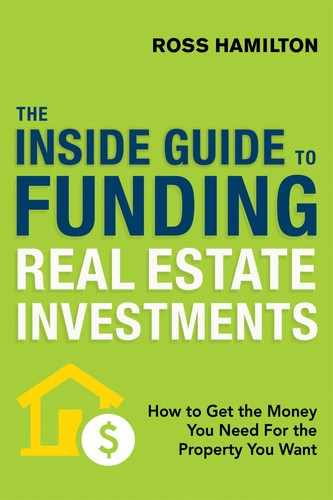INSIDE THE MIND OF ASSET-BASED LENDERS
What Do You Need to Know to Get Your Deal Funded?
The business of hard money, asset-based lending is all about the numbers—but that’s not the whole story. When you are considering using asset-based funding, you need to understand the mindset of lenders: What are they looking for in the property, the project, and the project’s principal . . . you, the investor?
Lenders of all types use the rule of “the six C’s” when considering funding a property. Their goal is to minimize risk while still making money. Lenders are not just looking for higher yields, they’re looking for safe, secure investments that return capital and a solid return on investment (ROI). They want to know how and when they’ll be paid back and they like to build repeat business with investors, so relationship building is key.
Lenders often use a “decision matrix” to help guide them in deciding whether to underwrite a loan. Most use the six C’s to make an initial determination if the property, the project, and the principals can stand up to the rigors of the underwriting process.
The Six C’s
1.Collateral. Lenders are in the money business, not the real estate business. They will carefully consider all aspects of the property—its physical condition, its marketability, and its profit potential, among others—all to determine what kind of equity cushion the property offers in its loan-to-value (LTV).
2.Capacity. Lenders will look for assurance that the borrower has the capacity to carry out the terms of the loan. They will look at experience, outcomes, partnerships, resources, and existing obligations of the borrower.
3.Character. Many lenders also look into the character of the potential borrower. They may do background checks looking for liens and judgments, criminal background, and other derogatory public records.
4.Conditions. To minimize risk, many lenders look carefully into the conditions surrounding the property: How is the market in the target investment area? What is the availability of resources and other property inventory? Is there demand for the property at resale or rental?
5.Capital. The whole notion of “no money down” in real estate investing is misleading. No-money-down transactions are rare—and nearly nonexistent with most lenders. While it is possible to have none of your own money down, lenders still require that the borrower have skin in the game in the form of a down payment.
6.Credit. With asset-based lending, credit isn’t most important but it still plays a role. Good credit can make the difference between a yes and a no; it’s really a matter of how good (or bad) the borrower’s other five C’s look to the lender.
There’s flexibility, so don’t be overly concerned if you are a new investor. Maybe you don’t have the capacity of a more experienced investor, but you’ve got great collateral, character, capital, credit, and conditions. You’re still in the running; you just may need to bring a little more equity or capital to the table.
What Scares Lenders Away?
Money is attracted to opportunity, not people. Lenders are looking for the opportunity to make money loaning you money. Investors just getting started don’t have the pedigree, but that alone won’t scare off lenders. What you have to do is “show them the money.” Despite a lender’s eagerness to profit, there are lots of other things related to the six C’s that can scare off a lender.
The Collateral
In the lender’s mind, the thought is, “Would I want to own this real estate if there’s a default?” Location and condition can be a factor. The value plays a major role. The appraisal comes in and it’s not good. Was the after-repair value (ARV) too low? Were the costs of repairs too high? You have to be realistic about your numbers.
Your Capacity
Borrowers who can’t demonstrate a clear ability to repay the loan—either through their own resources or those of others—will be a “no way” flag for a lender.
Your Character
Deals gone bad, unpaid debts, criminal activity—these problems and more can derail funding. Some lenders sell the notes they write, so they are looking for solid performance and good business practices.
The Conditions
Market conditions and geographics can cause a lender to turn away. Not all lenders loan in all locations and asset classes.
Capital
The notion of “no money down” is a misnomer. Using a partner, it’s possible to use none of your own money. Lenders will require skin in the game, however, so expect to bring money to closing—either your own or someone else’s—to get your deal closed.
Your Credit
A compromised (or nonexistent) credit score isn’t reason for denial alone, but it weighs into the pros and cons of the rest of the loan application.
What If You Can’t Repay?
Before issuing funds, asset-based lenders will vet the property and the numbers thoroughly. You have to always remember that they are in the loan business, not in the real estate business, and they do not want to foreclose and become property owners. But sometimes deals go bad. Lenders will respond more positively to possible workout solutions with borrowers who keep the lines of communication open, which is preferred to a costly foreclosure. Some lenders can offer loan modifications, extensions, and other possible solutions. This topic is covered in more detail in Chapter 39.
What’s Your Next Step?
Understand that companies that lend money on residential investment properties need you just as much as you need them. Billions of dollars have been raised and are available to help you grow your real estate investing empire. The key is understanding lenders’ criteria and developing relationships of mutual benefit.
 TAKEAWAYS
TAKEAWAYS
![]() List the six things that will scare away an asset-based lender.
List the six things that will scare away an asset-based lender.

